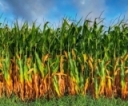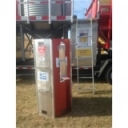Current Projects
Relevant Events
NYSDEC How to Get Certified Course
March 3, 2026 : NYSDEC How to Get Certified Course
Ellicottville, NY
Mid Atlantic Grain Conference
March 15 - March 16, 2026
EPA Approves Federal Registration for Over-the-Top Dicamba Application
Katelyn Miller, Field Crops and Forage Specialist
Southwest New York Dairy, Livestock and Field Crops Program

The EPA has approved federal registration of three over-the-top dicamba products in soybeans. While dicamba has remained on the market, this is approval specifically for OTT use, marking the strongest environmental protections for dicamba products.
Drones in Agriculture: Exploring Opportunities
Katelyn Miller, Field Crops and Forage Specialist
Southwest New York Dairy, Livestock and Field Crops Program

A follow up article to "Drones in Agriculture" in October 2024, this article dives into the opportunities to integrate drones into spray programs.
The Tillage Toolbelt: Nutrient Cycling
The decision to till or no-till is not a one size fits all approach. This article series aims to clear up some of the confusion about the ways that tillage (or a lack thereof) impacts our fields, and how the challenges you face could determine whether it's the right move for you.
Combine Adjustments to Minimize Corn Harvest Losses

Volunteer corn infestations popping up in your crop rotation can reduce crop yield and require additional herbicide considerations. Now is the time to prepare for harvest by calibrating your equipment to minimize harvest losses.
Management Considerations for Immature and Frosted Corn Silage

With our average frost date fast approaching, it's time to consider how we are going to handle corn that is either immature or experiences a frost. Check out this article for tips on how to manage this forage.
Guidance for Manure Applications on Prevented Planting Acres
Many acres across New York were unable to be planted to corn, soybeans or new perennial forages due to extended wet conditions during this spring's planting season, resulting in several crop insurance claims. Check out this guidance for manure applications on prevented planting acreage for farms under CAFO permit and/or following a CNMP.
Pricing Corn Silage - Preliminary Fall 2025 Estimates

You might think it's too early to talk about corn silage harvest, but this season's challenges have many re-evaluating plans. Preliminary estimates from John Hanchar, NWNYDLFC, put the corn silage price at approximately $63 per ton. These early estimates can support informed decision-making as cropping and forage strategies shift.
Ag Safety and Health Springtime Preparations

Spring is one of the busiest times of the year on a farm. Even if things are busy, keep health and safety to the forefront of what you do.
USDA Expediting Direct Economic Assistance to Agricultural Producers

U.S. Secretary of Agriculture Brooke Rollins announced that the U.S. Department of Agriculture (USDA) is issuing up to $10 billion directly to agricultural producers through the Emergency Commodity Assistance Program (ECAP) for the 2024 crop year. Eligible producers must report 2024 crop year planted and prevented planted acres to FSA on an FSA-578, Report of Acreage form. Contact your local FSA office for more information.
Winter and wet weather manure spreading reminders
NYS Department of Environmental Conservation is reminding farmers to be mindful of conditions that are high risk for runoff.
Demystifying Ag Value Assessments: A Summary for Landowners and Farmer Renters
Katelyn Walley, Business Management Specialist and Team Leader
Southwest New York Dairy, Livestock and Field Crops Program
Farming comes with plenty of challenges, and property taxes is a pretty big one of them. In New York, the Agricultural Assessment Program helps lower property taxes for land used for farming. Every year, if you own or rent farmland, this program can save you money. Here's what you need to know to take advantage of this benefit AND connect with rented landowners to ensure they're receiving this benefit.
Win a Grain Rescue Tube and Training for Your Local Fire Department

Win a grain rescue tube and training for your fire department! Nationwide Insurance once again is teaming up with the National Education Center for Agricultural Safety (NECAS), Peosta, Iowa, to award emergency first responders with grain rescue tubes and hands-on rescue training to help save lives.
Upcoming Events
Boots in the Barn: Cornell Dairy Research Updates
January 13, 2026
January 20, 2026
January 27, 2026
February 3, 2026
February 10, 2026
February 17, 2026
February 24, 2026
Deerworm and Flukes in Small Ruminants Webinar
February 25, 2026 : Deerworm and Flukes in Small Ruminants Webinar
NYSDEC How to Get Certified Course
March 3, 2026 : NYSDEC How to Get Certified Course
Ellicottville, NY
Announcements
Cows, Crops & Critters Newsletter Sponsorship
TRYING TO REACH GROWERS AND AGRIBUSINESSES IN OUR SOUTHWEST REGION OF NEW YORK?Weekly Email Update: Shared with 625+ households who have signed up with our program.
Monthly Paper Mailer: To reach our stakeholders and farmers who lack internet access, we send out a monthly mailer where your company's logo and contact information would be featured with a mailing list of 330+ households.
If you sponsor our weekly and monthly publications you reach approximately 955 households.






